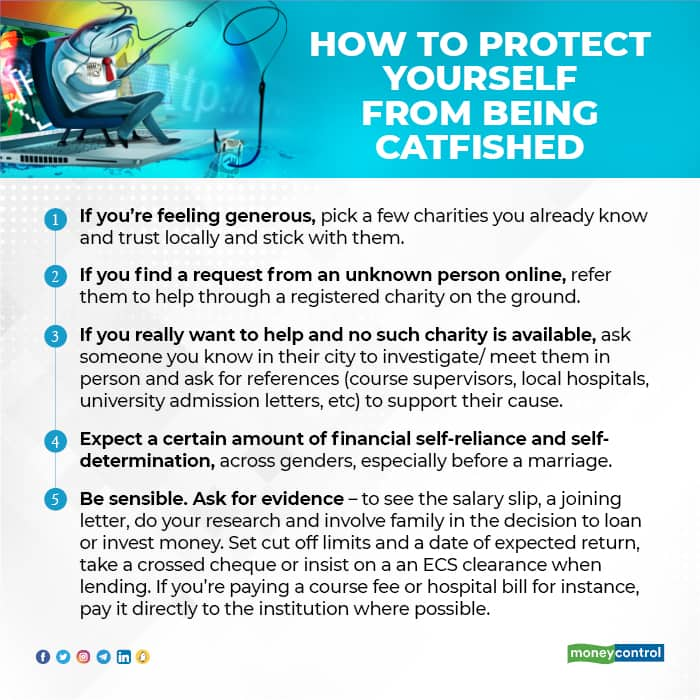



Note to readers: Healing Space is a weekly series that helps you dive into your mental health and take charge of your wellbeing through practical DIY self-care methods.
Recently, social media has been abuzz with catfish controversies. A catfish is someone who takes on an assumed identity online, often stealing profile pictures, creating fake handles, and pretending to be in situations or act for causes that are simply not true.
 Read more Healing Space Columns here
Read more Healing Space Columns here
In recent weeks, on Indian X (formerly Twitter) one friend has been outed by another on social media for faking cancer and raising funds for chemotherapy. A popular X-er whom many blue tick handles followed, used a fake profile picture, handle, and raised funds for stray dogs. There has been a recent spate of romance scams, bitcoin scams, wedding hoaxes such as those depicted in OTT shows such as Wedding.con, Bitconned, or the Tinder Swindler and several more rage among our friends and social networks that are not often publicised.
The scammy situations range from friendship and romance to social causes and professional lies. We’re not even talking about elaborate financial hoaxes such as the Fed Ex scam, the Aadhar scam and several UPI related stunts being pulled across the country which have a clear monetary goal and seem to emerge from a professionally run nexus. Catfish stunts are even worse because they seem to go beyond raising cash and play mind games with and inflict emotional damage on their victims.
How do people who orchestrate such hoaxes get the willing participation of their victims? By carefully deployed strategic hits. It’s an emotional and mental game of preying on vulnerabilities as much as it is a financial and social one.
They choose victims carefully. Often, people who fall prey to such scams on social media talk a wise and woke game, promote beneficial social causes, and build an image of the do-gooder and peacemaker, and take pride in being seen as generous people socially. The scamster relies on winning such people over to boost their profile and credibility. So they follow, talk the same kind of bleeding heart liberalism, and invite the following of a ‘kind’ of credible handle. They also rely on a bit of social boosting, such as thanking people for donations, help, and gambling on the fact that people will post that they have donated in the name of encouraging other such donations. For instance, a lot of well-known handles in visible jobs, with many followers, donated to the causes for animal charities and chemotherapy.
How do scamsters know they will? Because most people with a bit of cash to spare have guilt about their good luck when others suffer. Most will try to contribute what they can when someone says they have admission to a university and while they have a scholarship, they are from an underprivileged background and need help to raise living expenses. We’ve been sold the idea that if your charity isn’t visible enough, it isn’t alleviating your privilege enough, and people who are relatively better off than others have an urge to post about their generosity to prove their empathy and to contribute to the image of an equitable society. The scamster is banking on the guilt.
The scamster also uses commonly identifiable causes to tug at the heart strings and push their cause. To say that one is from a marginalised community, to use a backstory of struggle, youth, terminal illness, poverty, stray animals, a unique once-in-a-lifetime opportunity that cannot be missed, ill luck and appealing to the mercy of strangers are all tropes designed to grasp the attention. You’re meant to ask ‘what if that had been me?’ or even ‘I know someone this happened to’, and so the scamster uses situations that have great resonance for the greatest number of people.
The proliferation of crowdfunding sites and success stories have also made it possible for us to accept that people would and could ask for support in this way.
They rely upon an imposter syndrome. Most intelligent people feel foolish if they are proven to be supporting a lie, and so might stay silent, or keep throwing good money after bad in a state of denial. It feels like an insult to one’s intelligence. ‘I thought I was smarter than that’ most people think to themselves, and so they stay invested in the scam. When you harbour a doubt, you decide to brush it aside in case it shows you up as immature and if you’re highly qualified or in a senior position, that’s a risk you don’t want made known, even to your family. Hence, it preys on your ego and the vulnerabilities in your self-image.
In the wedding and romance cons, for instance, the scamster is using emotional blackmail and striking at the heart of loneliness, social stigma, and the hope for a good relationship, which most of us are gullible to. The scamster finds someone with existing insecurities, and weaves a trap such that they are stuck between two choices that leave them the loser either way. If you trusted the person you hoped to marry, what’s money between you? And if you don’t, why do you say you trust the person enough to hope to marry them? Either way, you stand to lose the relationship, so they gamble that you choose to put your faith in the best possible outcome. This is also because people in love tend to be a little emotionally trusting and blind to flaws. Even when red flags are raised by family and friends, victims can first move to protect the self-image than the finances.
Apart from a failing in law and order or protective systems owed to society by financial institutions, such scams expose the emotional and social vulnerabilities of individuals. Ideas such as honour, guilt, privilege, compassion, generosity that we are trained to cultivate are used against us, as we hurry to provide evidence of our best selves without checking. Remember: prudence and protecting your self-interest first doesn’t mean you’re a bad person, just a cautious one.
 How to guard against catfish, online scamsters who create fake profiles, stories, accounts for personal gain.
How to guard against catfish, online scamsters who create fake profiles, stories, accounts for personal gain.
Discover the latest Business News, Sensex, and Nifty updates. Obtain Personal Finance insights, tax queries, and expert opinions on Moneycontrol or download the Moneycontrol App to stay updated!
Find the best of Al News in one place, specially curated for you every weekend.
Stay on top of the latest tech trends and biggest startup news.